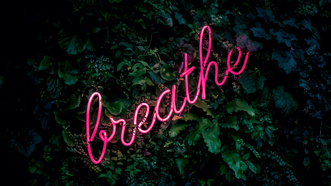Your Hair + Stress
Your Hair + Stress
Author: Jenna White | San Francisco Hairstylist
July 30th, 2020
July 30th, 2020
People are undergoing one of the most stressful times of the 21st century to date. In response to COVID-19, the Center for Disease Control and Prevention (CDC) has dedicated a page on their website to dealing with this titled "Coping with Stress". Your hair is likely feeling some pressure from the pandemic as well. Telogen effluvium is temporary hair loss caused by chronic stress or a traumatic event (1). Hair typically has three cycles (2):
When the body is under stress our hair is signaled to stay in the resting phase. Around 5-10% of our hair is consistently in this phase, but when experiencing telogen effluvium this goes up to around 30% (1). When the growth phase shuts down and the resting phase is turned up you'll notice more shedding, resulting in thinner hair. You lose around 100 hairs per day, but when experiencing this condition that number is closer to 300+ hairs per day (1). Luckily, this is usually temporary and often affected by how we decided to deal with stress. Read on to learn more about how to save your hair when experiencing stress.
Scalp Health
Increased blood flow has the potential to help your hair grow. Try some of the following tips from hairfuel.com to stimulate the scalp and induce hair growth:
For a primer on scalp massages, check out this YouTube video titled Self Scalp Massage to Combat Stress and Anxiety by Morgan Roy Beauty.
Exercise
Similar to scalp massages, exercise can promote a healthy hair cycle by increasing blood flow. It also increases the amount of oxygen your body produces, which leads to better brain performance (7), plus reduced levels of adrenaline and cortisol, which are stress-inducing hormones (8). I love use the resources below for exercise inspiration.
Nutrition
Good nutrition is a key way to keep your hair out of the resting phase. Look for advice from your healthcare provider or a registered dietitian. For the latter, I recommend checking out Shauna Harrison's Instagram and blog posts (link to one of my favorite posts she published here). The CDC has also published some guidelines for Healthy Eating Tips on their website. Keep in mind that crash diets can lead to hair loss because they create stress on the body. Extreme examples of this are caused by eating disorders like bulimia (3) and anorexia (4). Personally, some of my favorite nutrient rich foods to keep on hand are goji berries (or any berry), nuts, seeds, sweet peppers, fresh herbs, spices, avocados, sweet potatoes, spinach, and lentils.
Meditation
Studies have linked meditation to significant health benefits, which may include better sleep, control of depression and anxiety, management of mental health, and brain functionality (9). If you've been curious about trying it out, now is probably the time. Beginners can learn more from the resources below.
- A growth phase (Anagen)
- A transition phase (Catagen)
- A resting phase (Telogen)
When the body is under stress our hair is signaled to stay in the resting phase. Around 5-10% of our hair is consistently in this phase, but when experiencing telogen effluvium this goes up to around 30% (1). When the growth phase shuts down and the resting phase is turned up you'll notice more shedding, resulting in thinner hair. You lose around 100 hairs per day, but when experiencing this condition that number is closer to 300+ hairs per day (1). Luckily, this is usually temporary and often affected by how we decided to deal with stress. Read on to learn more about how to save your hair when experiencing stress.
Scalp Health
Increased blood flow has the potential to help your hair grow. Try some of the following tips from hairfuel.com to stimulate the scalp and induce hair growth:
- The Inversion Method: Oiling, Massaging, Inverting (6)
- Scalp massages sans product (5)
- Hair growth serums containing caffeine (5)
- Derma rolling (5)
- Ingesting castor oil (5)
For a primer on scalp massages, check out this YouTube video titled Self Scalp Massage to Combat Stress and Anxiety by Morgan Roy Beauty.
Exercise
Similar to scalp massages, exercise can promote a healthy hair cycle by increasing blood flow. It also increases the amount of oxygen your body produces, which leads to better brain performance (7), plus reduced levels of adrenaline and cortisol, which are stress-inducing hormones (8). I love use the resources below for exercise inspiration.
- YouTube with Sydney Cummings, tough daily workouts every day at 5pm EST
- The Ultimate Health Podcast, published weekly with information on health and working out
- The Model Health Show, focused on health, working out and sleep
- Optimal Daily Living, shorter podcasts on health and wellness
- YouTube with Tom Bilyeu, interviews with top health professionals
- Breath: The New Science of a Lost Art, a book that teaches how adjustments to the way we inhale and exhale can jump-start athletic performance
Nutrition
Good nutrition is a key way to keep your hair out of the resting phase. Look for advice from your healthcare provider or a registered dietitian. For the latter, I recommend checking out Shauna Harrison's Instagram and blog posts (link to one of my favorite posts she published here). The CDC has also published some guidelines for Healthy Eating Tips on their website. Keep in mind that crash diets can lead to hair loss because they create stress on the body. Extreme examples of this are caused by eating disorders like bulimia (3) and anorexia (4). Personally, some of my favorite nutrient rich foods to keep on hand are goji berries (or any berry), nuts, seeds, sweet peppers, fresh herbs, spices, avocados, sweet potatoes, spinach, and lentils.
Meditation
Studies have linked meditation to significant health benefits, which may include better sleep, control of depression and anxiety, management of mental health, and brain functionality (9). If you've been curious about trying it out, now is probably the time. Beginners can learn more from the resources below.
- Mediation for Beginners: 20 Practical Tips for Understanding the Mind, zenhabits.net
- How to Meditate, The New York Times
- Easy Guided Meditation for Beginners - 15 min Meditation for Clarity & Relaxation, YouTube Yoga with Kassandra
It's normal to feel out of sorts right now. One of the worst aspects for me has been not knowing why I'm feeling restless and nervous. To cope, I try to release myself from unrealistic expectations and focus on what I can manage one day at a time by checking in with myself, observing my feelings without judgment, and working to identify the reason behind those feelings. Below are a few folks I look to for inspiration when dealing with the high-stress pandemic environment. Stay relaxed, happy and healthy!
Sources
- Dan Harris's podcast Ten Percent Happier, if you're more of a reader check out some of his books
- The Work of Byron Katie, a simple a process for remaining alert to and questioning stressful thoughts
- Sam Harris's Making Sense podcast and his Waking Up app
Sources
- Telogen Effluvium, Harvard Health Publishing, Harvard Medical School
- Hair Loss: The Science of Hair, WebMD
- Bulimia Nervosa and Hair Loss, hairscientists.org
- Anorexia and Hair Loss, hairscientists.org
- Blood flow is THE number one thing in hair growth, thehairfuel.com
- Inversion method for hair growth: myth or miracle?, thehairfuel.com
- Why Do I Think Better after I Exercise?, scientificamerican.com
- Exercising to Relax, Harvard Health Publishing, Harvard Medical School
- Meditation and Mental Health, Psychology Today






